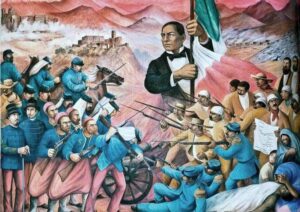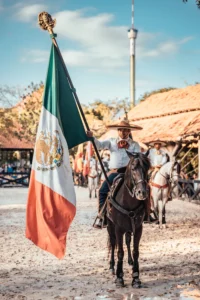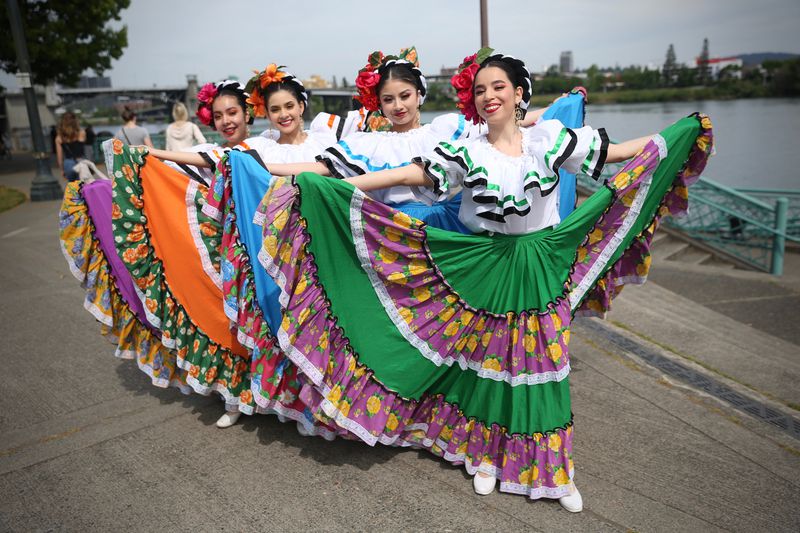Cinco de Mayo (5th of May), is a widely celebrated annual holiday in the United States, one that is also synonymous with huge parties, alcohol, and celebratory gatherings connected to Mexican culture. Contrary to popular misconceptions, it is not Mexican Independence Day (Actually September 16th) which it is often mistaken for. Behind the parties, festivities, and commercialization of the holiday lies a complex intricate history that remains typically misunderstood within the general public. By diving into the historical facts we see just how significant the day is specifically to the state of Puebla (Mexico), and how the holiday impacts the United States and its ties with Mexico.
The history of the holiday traces back to 1861 when Mexico defended itself against the invasion of France and European allies in the Franco-Mexican War, leading to military battles over Mexico’s territory. Specifically, the Battle of Puebla would go on to signify the importance of May 5th. Let’s now dive into pre – Cinco de Mayo facts – Prior to the battle of Puebla on May 5, 1862, Mexican President Benito Juarez (newly elected) had decided to temporarily forego payments and debts owed to European countries Spain, France, and Great Britain. At the time, Mexico had been under financial strain due to prior wars, The Mexican-American War (1846-1848), and The Reform War (1858-1861). The Mexican-American War had resulted following the United States’ annexation of Texas in 1845, and disagreements over territory between Mexico and the U.S. The Reform War was a civil war in Mexico between liberal Mexicans who sought separation of church and state, and Mexican conservatives who strongly supported religious ties between The Catholic Church and Mexico’s government. Conservative Mexicans eventually lost the war to their liberal counterparts leading to the presidency of the liberal-backed Benito Juarez.

Both of these wars had a significant impact on Mexico’s economy and financial state, leaving the country virtually broke. The President’s decision to temporarily suspend debts owed to Europe did not sit well with the Europeans which led to the deployment of naval ships to Mexico. Military from all 3 countries would soon arrive in the State of Veracruz in December of 1861 to seek repayment. On the verge of war, Mexico successfully negotiated with Spain and Great Britain which led to their withdrawal from Mexico. However, France decided otherwise, at the time France was led by the ambitious Emperor Napoleon III who capitalized on the opportunity and sought to establish French rule in the region. The Emperor subsequently led his troops into attacking the State of Veracruz resulting in President Juarez’s retreat into Northern Mexican territory. As the French military made its way through Mexico, they landed in the city of Puebla (Capitol of the State of Puebla) in early May of 1862 with between 6,000 – 8,000 French military personnel who at the time held one of the strongest and most powerful military operations in the world. The Mexican military had nowhere near the arsenal and troops compared to the French, and were easily outnumbered. Led by General Ignacio Zaragoza, the Mexican army heavily defended its territory resulting in numerous deaths on the French side forcing France to flee. The Mexican army’s success on May 5th, 1862 was a huge victory for both the city of Puebla and President Juarez which symbolized a sense of national pride for Mexico and helped propel morale within the country. Celebrations were also held in Los Angeles and in predominant Mexican-American neighborhoods in the states.

Although Mexico had been victorious in saving Puebla, the success was only temporary for about a year. The defeat at the hands of the Mexican army angered Napoleon III who sent close to 30,000 more French troops to Mexico, seizing Puebla and Mexico City the following year in 1863. France now occupied all of Mexico with Napoleon electing Austrian archduke Ferdinand Maximilian Von Habsburg as Mexico’s new ruler under false pretenses which established the Second Mexican Empire. Maximilian initially agreed to rule Mexico only if the Mexican people were in favor of such a change. Napoleon III drafted a fraudulent voter result and persuaded the young archduke to ascend to Mexico. The aristocratic Maximilian was a young and ambitious leader who came from royalty; his elder brother Franz Joseph had been the Emperor of Austria. Conservative Mexicans were also in favor of a European-style monarch ruling the country as they opposed Juarez’s policies, but were left disappointed due to Maximilian’s progressive liberal ideals. Upon becoming Mexico’s Emperor, Maximilian I decided to end child labor, protect indigenous Mexicans, and allow religious freedom. He initially offered Juarez a position as Prime Minister if he swore allegiance to his crown, which Juarez refused. Emperor Maximilian I remains a controversial figure in history as a well-to-do ruler fueled by genuine ambition mixed in with costly mistakes, ignorance, and unpopular decrees which propelled his untimely destiny towards the end.
Eventually, France’s occupation of Mexico lasted until 1867 when Napoleon III decided to fully retreat from the country due to multiple instances. The U.S. Civil War had finally ended in 1865 after 4 years which gave the U.S. room to aid Mexico with military weapons against France while adding diplomatic pressures upon them in utilizing the Monroe Doctrine, a U.S. created policy by (President James Monroe in 1823) which warned European nations to stay out of the Western Hemisphere pertaining to colonization. This policy was an advantage to Mexico, as it helped drive out the French regime with the diplomatic backing of the United States.

After Napoleon’s retreat, Juarez was able to re-establish himself as President. Maximilian I (Emperor of Mexico) had decided not to leave Mexico with the French personnel which became a costly mistake as he was eventually captured by Mexican forces and executed by firing squad in June of 1867. With French forces pulling out, there was no protection left for the young Emperor, and he seemingly did not regret the decision to stay due to his dedication to his new land.
According to scholars, France would have aided the U.S. Confederate Army and Southern states against the Union (had they not been driven out of Puebla by Mexican forces) in exchange for goods. Cotton was in high demand at the time due to Abraham Lincoln’s (The Union) blockade of shipping ports in the American South which made it harder to retrieve goods. The French had eventually made their way up to the Texas-Mexican border gaining control by the summer of 1863, a little over a year after “Cinco De Mayo.” As the French had been stalled by a year in gaining control of the border, the Confederate Army in the meantime had weakened and were lacking weapons due to their loss at The Battle of Vicksburg (Mississippi) where Union Leader and General Ulysses Grant became victorious, eventually cutting off weapon supply to the Confederates.
Per historians, had the French won the Battle of Puebla on May 5th, 1862, the outlook of the United States could have been significantly different and possibly in the hands of the Confederacy thereafter. This would have changed the course of the U.S. and possibly extended slavery. Although France did not publicly support the Confederate States, Napoleon III was apparently willing to secretly help them for favors in return as noted earlier. After Abraham Lincoln was assassinated in 1865, Andrew Johnson became President and further advocated for French withdrawal following Lincoln’s wishes.

In looking at Cinco De Mayo in retrospect, it is interesting to note what role the United States played in helping Mexico drive out French forces in 1867, 5 years after the initial Battle of Puebla. In defeating the French, Europe’s attempts at invading North America, Mexico, and South America had halted altogether. Years later in the 1960s and 1970s, the Chicano movement began to rise in the U.S., and many Chicano activists began to reflect and celebrate Cinco De Mayo as they resonated with the unlikely win and fight against colonialism and racism. President Benito Juarez had also been of an indigenous background coming from the Zapotec people in Oaxaca. He was orphaned at a young age and did not learn Spanish until his teen years since he spoke his indigenous dialect. His overall victory, and accomplishments as an indigenous Mexican President inspired many Chicanos to celebrate the holiday in the U.S. during the Chicano movement, bringing more accolades to the day. Juarez’s presidency also had its controversies with resistance not only from conservatives, but from others who felt he abused his power by attempting to run for a third term which many viewed as a power grab and dictatorship. Nonetheless, his legacy is cemented in Mexican history. Mexico also remained fairly unstable following the French withdrawal in 1867 with major internal conflicts and changes in policies and culture when The Mexican Revolution hit from 1910 – 1920.
Looking at Cinco de Mayo today, it is celebrated in the state of Puebla with music, war reenactments, military parades, and food such as Mole Poblano. The holiday is also celebrated in other parts of Mexico, and in the United States where it has turned into a money-making profit, and over-commercialized and gentrified holiday at the expense of Mexican culture. The day is tied to the overindulgence of alcohol, margaritas, chips and guacamole along with non-Mexicans and non-Latinos partying excessively. Beer companies in the U.S. are also at fault for commercializing the holiday, as they have targeted campaigns aiming towards Latinos and the general public in drinking Mexican beer. Unfortunately, many Americans have utilized the holiday to parody Mexican culture, and the historical significance behind the holiday has lost its substance and true meaning.

As we celebrate and partake in Cinco de Mayo festivities today, let’s not forget its true value and history. Let’s remember the fallen military personnel who passed away while battling, the Mexican people who suffered at war and the courage of an underdog country who fought to save their land.
References:
Cinco de Mayo 2023: Facts, Meaning & Celebrations | HISTORY
7 Things You May Not Know About Cinco de Mayo (history.com)
Cinco de Mayo’s surprise victory affected both Mexican, US history (mexiconewsdaily.com)
History & Holidays: A Brief Comment on Benito Juárez (mexperience.com)
Mexican-American War | Significance, Battles, Results, Timeline, & Facts | Britannica
Cinco de Mayo | History, Celebrations, & Facts | Britannica
Maximilian | archduke of Austria and emperor of Mexico | Britannica
Monroe Doctrine (1823) | National Archives
Puebla | Description, History, Culture, & Facts | Britannica
What Americans Need to Know About Cinco de Mayo – CNET
How Cinco de Mayo Helped Prevent a Confederate Victory in the Civil War (history.com)
Battle of Puebla | Mexican-French history [1862] | Britannica
Long View: When An Austrian Archduke Became Emperor of Mexico (americas quarterly.org)
The fate of the second-born son | Die Welt der Habsburger
The Mexican War of Independence: Maximilian I of Mexico | Saylor Academy
The Mexican Revolution | History Today
The Union Blockade: Lincoln’s Proclamations | National Archives
Abraham Lincoln: Facts, Birthday & Assassination | HISTORY
Ulysses S. Grant | The White House
Obsidian Mirror-Travels: French Intervention in Mexico (Getty Research Institute)
Heritage History: Franco-Mexican War (heritage-history.com)











